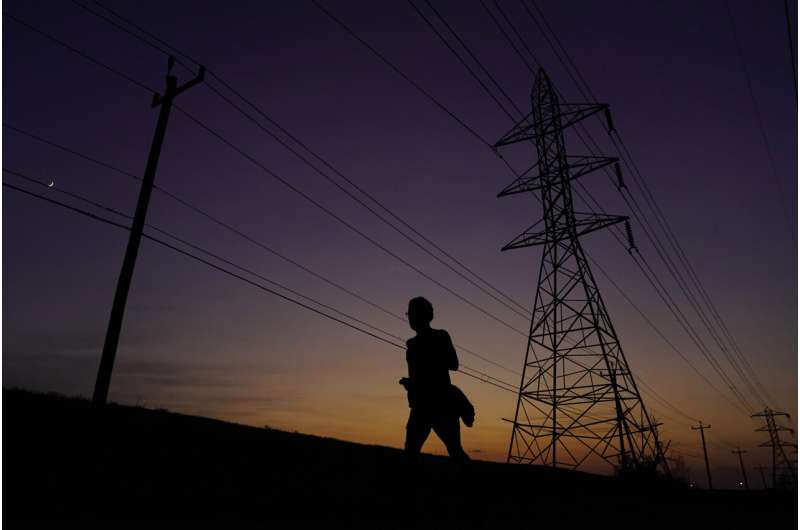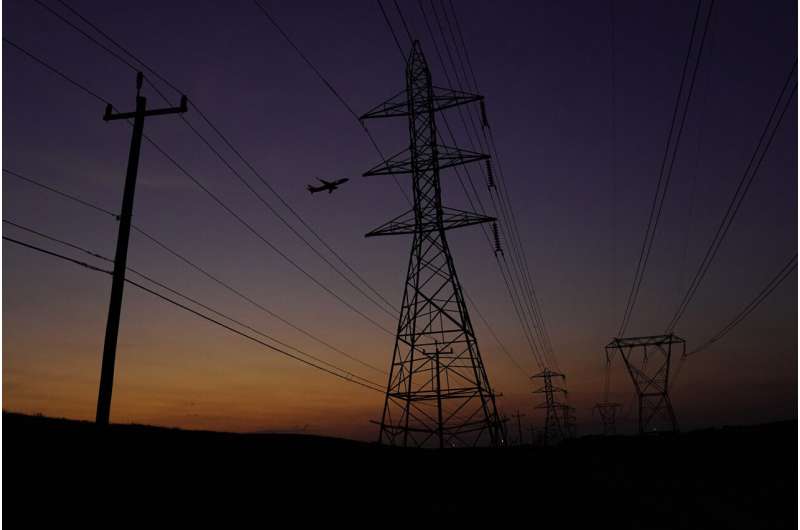This article has been reviewed according to Science X's editorial process and policies. Editors have highlighted the following attributes while ensuring the content's credibility:
fact-checked
reputable news agency
proofread
Deadly heat wave in the central US strains infrastructure, transportation

Temperatures have soared in the central U.S., leading to deaths in some states as more dangerous heat is expected, a national weather service official said.
The harsh heat wave has broken records, caused damage, shortened school days and forced the evacuation of a nursing home this week as some cities brace for triple digit temperatures through August. There have been 25 heat-related deaths this summer in Louisiana, officials said Tuesday, and in Nebraska, a 1-year-old left in a hot van died.
The heat is expected to become "dangerous to the average person" if they don't have air conditioning, said Alex Lamers, warning coordination meteorologist at the National Weather Service's Weather Prediction Center.
It has felt hotter than 110 degrees in cities in Texas and Louisiana more often than at any time since World War II, Lamers said. The brunt of the enduring heat has hit states from Florida to New Mexico, he said.
The Electric Reliability Council of Texas asked residents twice last week to conserve energy because of high demand and low reserves. The agency issued a weather watch from Wednesday to Aug. 27.
The council hasn't had an outage all summer despite unrelenting heat and high demand, said Alison Silverstein, a Texas-based independent energy analyst and former adviser to the state's energy regulator.
But there are risks the longer this drags on, Silverstein said, comparing it to a car overheating.
"At least your car on a long trip has a chance to rest overnight and cool off," she said. "A lot of these plants have been running nonstop, or pretty close to it, since June."
Experts warn infrastructure like roads can buckle under the extreme strain of enduring and recurring heat waves brought on by climate change. Union Pacific has imposed more speed restrictions this summer across its network of more than 32,000 miles (51,499 kilometers) of Western track as a "precaution to reduce the impact on the rail when it gets hot," spokeswoman Kristen South said Tuesday.
Costs in the U.S. for road maintenance and replacement due to rising temperatures could reach $26.3 billion by 2040, with most of the damage expected to hit Texas, California and Illinois, according to a 2017 study by University of Arizona and Arizona State University researchers.
The heat has already caused an unusual number of Texas water line breaks and roadway issues.
Texas officials are monitoring the heat, roadways and tips from residents to address issues as quickly as possible, said transportation department spokesman Danny Perez. Houston officials learned of likely heat-related damage to a road Sunday after about 10 other similar reports in June, he said.

Houston's high temperatures and a lack of rain have caused the ground to shift and damage the city's aging pipes. Residents' top service request is for water leaks, according to city data. Reports of water leaks from the past month were up 25% from the same period last year.
Demand and leaks are both increasing, and the city is using emergency purchase orders to add contractors for repairs, said Erin Jones, Houston Public Works spokeswoman.
San Antonio Water Systems has already tallied more breaks this month than in all of July, said the agency Wednesday. Customers need to cut back on outdoor watering, the agency said.
Students across the U.S. are learning in roasting classrooms or having their days cut short, including over a dozen in Denver on Wednesday. Chicago-area schools are delaying classes or ending them early. Milwaukee Public Schools, Wisconsin's largest, closed campuses through Thursday.
An estimated 36,000 schools across the U.S. need to update or install HVAC systems, according to a U.S. Government Accountability Office report in 2020. Without air conditioning, a 1 degree increase in temperature over the school year reduces student learning by 1%, according to a study by the National Bureau of Economic Research.
Cooling systems are also under strain. Missouri firefighters helped remove 117 patients from a Kansas City nursing facility Tuesday after the air conditioning failed in temperatures that felt as high as 115 degrees (46.1 C). Most Parkview Healthcare nursing facility residents were taken to other facilities, but seven who had COVID-19 were taken to hospitals, authorities said.
At least 20 complaints have been made against the facility in the past five years, since August 2018, according to the Missouri Department of Health and Senior Services.
Denise Oates, whose mother lives at the facility, told television station WDAF that it was upsetting to learn through social media that the air conditioning failed. She called and couldn't get any answers about what was happening, Oates said.
"I'm just like, 'Call me and let me know before you move her. I need to know where she moves to,'" Oates said.
The facility and owner, Cor Healthcare Partners based in Baltimore, did not immediately respond to requests for comment.
Not everywhere has been feeling the heat. In North Dakota, the city of Dickinson set a record of 60 degrees (15.6 C) for Aug. 20, beating the benchmark of 62 in 1974. On the same day, Bismarck tied its record of 62, set in 1966. The temperatures on Sunday were due to
An unseasonably cool air mass, clouds and rain helped bring temperatures down Sunday, but warmer temperatures are forecast in the coming days, said Corey King, an emergency response specialist with the National Weather Service in Bismarck.
© 2023 The Associated Press. All rights reserved. This material may not be published, broadcast, rewritten or redistributed without permission.



















